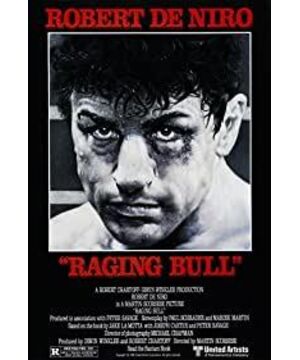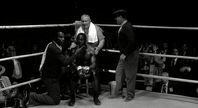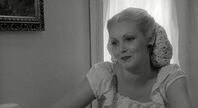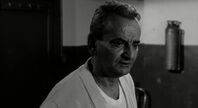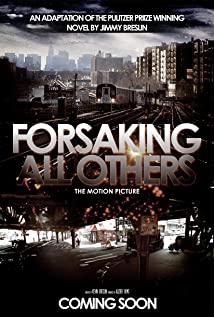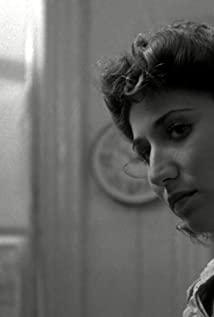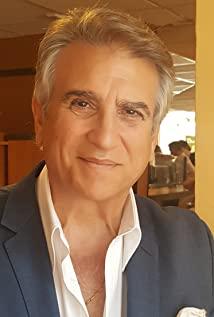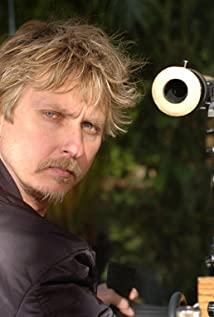I will simply interpret this theme from La Mota's two action sequences, namely his career line and emotional line.
The first is La Mota's career line. There were many boxing matches in the film, and it didn't take long before it was the first one. La Mota shot wildly and defeated the opponent, but the referee awarded the victory to the opponent. Because the opponent is sheltered by Mafia forces. The result of injustice caused riots in the boxing ring and directly ignited La Mota's anger. La Mota has extraordinary abilities and lofty ideals. He punches firmly. He thinks that his fist is as small as a woman, which restricts him from participating in heavyweight competitions. Such a strong-tempered person must be uncompromising and uncompromising when colliding with the outside world. So in the next few games, he always missed the world champion. It was not that he played badly, but that the game was shady. La Mota did not want to indulge in the Mafia, so she had to be cannon fodder. This actually reflects the social conditions in the United States in the 1940s.
Later, he finally compromised temporarily. He obeyed the orders of the Mafia and deliberately lost a game, allowing his opponent to win, so that those who bet on himself would lose all their money. And he was beaten badly, but even so, he still couldn't compromise on dignity. Similar to Hemingway's tough guy temperament, you can destroy a person, but you can never defeat him. It seems that La Motta has learned a little bit of survival law, and began to get along well with the world, no longer rebellious, but he still guarded the last point of himself. In the subsequent games, he defended his title without surprise, realizing his dream of being a world champion. In the defending game, he chose a very tragic way, as if to punish himself. On the surface of society, he has complied with the trend of forces, and the problem seems to have been solved, but his own inner conflicts have become more intense, and he despises himself like this. He finally realized his long-held dream, but he found subconsciously that he was not glorious or unhappy at all. The anger at this time is that you can't accept yourself. It is the most difficult for yourself to fight with yourself.
After that, he started to go downhill until he retired from boxing. This is inseparable from the flaws and weaknesses inherent in his character, and his violent, greedy, suspicion is fatal. He opened a bar, indulged in pleasure, because he was entertaining a 14-year-old girl and was arrested and imprisoned for public morals. The former boxing champion was escorted into the iron prison with his arms folded by police officers, like a trapped beast. Standing in the only beam of light, he hit the wall with his head and punched the wall faster and faster, harder and harder, repeating "idiot" and "why" in his mouth, heartbreaking. This reminds me of a sentence: "The world is like a wall, and we are like a cat. I have to leave my scratches on this wall. Before that, I will not turn my paws at myself. The degenerate La Mota in front seemed to "face his claws to himself", but in fact there was a strong personal will buried in his heart. At this moment, with this kind of fierce action, the more powerful it is, the more helpless it is. When one hits the reinforced concrete with his body, one wants to change the world and realize his ideals according to his own will. La Mota soon sensed this despair, he cried, and wondered to himself why he did this, saying that he was not a beast, and he was not a bad person. The character's mood is at its lowest, the scene is well completed, and the inherent tragic nature of the character enhances the dramatic tension.
After he was released from prison, he worked part-time in a tavern, a talk show host similar to gagging, and his job was not as good as before. But there was a change in his heart. There was no violent anger in the decline at this time, and there was more peace and relaxation.
Just say that his career development is incomplete, combined with the emotional lines of the characters. The emphasis is on family affection and love. The low-level anger in love is that after he lost the first game, he had a fierce quarrel with his first wife over steak. Characters must have an outlet for their emotions. If they are restrained outside, they will vent their negative emotions on people close to them. But this behavior is essentially close to passive resistance. It is a kind of oppression in itself, and people are just suppressed by life.
He later stayed with his second wife and suppressed his sexual desire because he wanted to compete. In fact, it also symbolized that people have to pay for the material pursuit of society, bear repression, and lose freedom.
In the second marriage, there is a scene in which the La Mota couple and La Mota’s brother Joey order a meal at a hotel. The brother chooses food for his sister-in-law, but La Mota is very irritable to let his wife choose by herself, and treat her very much. Why do you want to listen to others. This can be combined with La Motta being forced to cooperate with the Mafia, and then defend the title. He felt that he was being held hostage by the world, without free will and independent choice. He thought of his situation when he saw his wife. This anger seemed to be directed at his wife and younger brother, but in fact it was directed at himself and the anger that could be defended on the career line echoed.
In the end, La Motta and Joey reconcile the scene. The plot is dealt with here, and the story can be over. When La Mota learns to get along with himself, he can begin to accept the outside world and others. The relationship between the characters here finally returns to the original point, but it is no longer the original self, and the anger is not the anger of the past. This led to the climax of the theme. La Mota muttered to herself in the mirror in the dressing room, talking about the past, and then punched in the mirror, his fist rushed into the air, but it made me feel a kind of gushing vitality. . I think this is another kind of "angry" in understanding. Calm but powerful, peaceful but passionate.
The deep point of the film is that it shows that under the hard surface of life, personal impulsive rebellion but limited power, after many failures, almost breaking and reshaping, free will, passion and passion have been preserved in a more calm and mature way.
La Mota showed it well that it seemed that only by going against the current life could he truly understand life. "Life is a bitch, an actor, everything you can think of. Throw all your metaphors in it. You are always right. Because life is too strong, the strongest always knows how to refute you, even Let you decorate it, and then cover the pot quietly."
Finally, the anger after growing up is very good. This anger tells us one thing: "Life is not an abyss. It is the plain you walk through and the mountain you want to climb. It is like every bed we have slept on. , You never sink, maybe it doesn’t belong to us, but it must belong to you, you think it’s going down because of gravity, it will never drag you down the abyss, it just wants you to fall on the ground and listen Its sound, when you have rested and heard enough, you can stand up at any time.”
This is what La Motta said at the beginning of the movie, “Let me bull, have a stage to show off, although I can fight , I would rather chant, that is entertainment", this is also what La Motta said at the end of the movie, "Go on, champion." The structure echoes from end to end, which is also the climax of the theme.
I don’t think this movie talks about a loser, and I don’t think that "anger" can be dispelled. La Motta said: "I remember every boxing match, every uppercut, every hug, one People can get rid of the worst method of being weak. As you know, my life is vigorous. I would rather hear cheers. When I read Shakespeare, I would rather hear cheers." At the
end of the film, a section of the "Bible" is selected . talk. Regarding this as a metaphorical image, La Mota's previous ups and downs have passed, and the truth of life may never be known to people, just like an unknown criminal. The chaotic days in the past were like a long journey into darkness. After sufferings and failures, they returned to peace. Now the life will has a stable vitality. The fatal flaws and weaknesses in the character will not disappear, but neither fierce competition nor chaotic depravity. When the light appeared, La Mota's life had just begun.
The "bull" is always "angry". People are really alive, not walking dead. The difference between compromise and reconciliation lies in whether there is the kind of "angry" that is born to be human, that is just right, free and rational vitality.
View more about Raging Bull reviews


